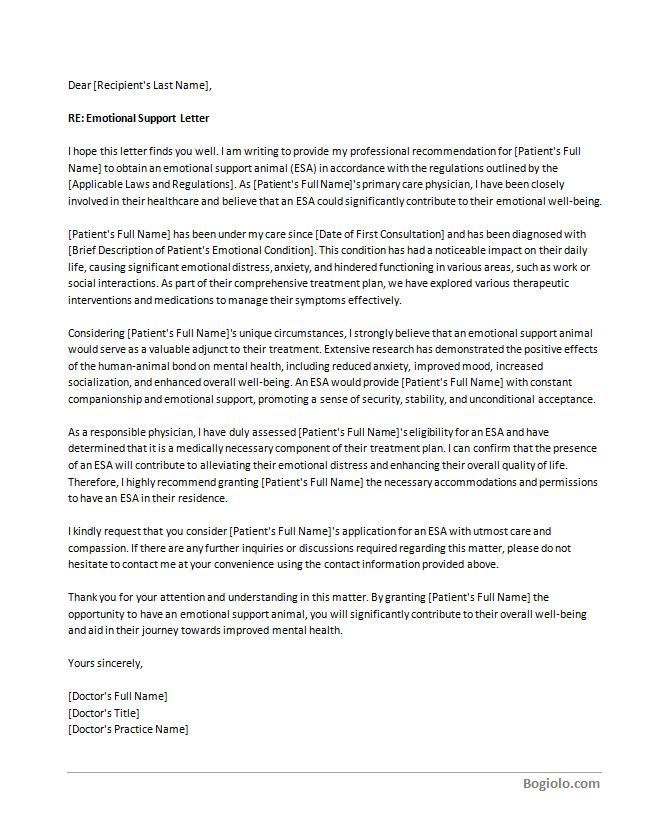
Emotional support animals (ESAs) have become increasingly popular in recent years, providing comfort and companionship to individuals struggling with various mental health conditions. These animals offer emotional support and can help alleviate symptoms of anxiety, depression, and other psychological disorders. However, to qualify for certain privileges and accommodations, such as housing and air travel, individuals may need an emotional support letter from a doctor.
This article aims to provide a comprehensive understanding of what an emotional support letter from a doctor is, why it is necessary, what to include in the letter, how to write one, and common mistakes to avoid. By exploring these topics, individuals seeking an emotional support letter can gain the knowledge they need to navigate the process successfully.
What Is an Emotional Support Letter from a Doctor?
An emotional support letter from a doctor is a formal document that verifies an individual’s need for an emotional support animal. It is typically written by a licensed mental health professional, such as a psychologist, psychiatrist, or therapist. The letter outlines the person’s mental health condition and explains how an emotional support animal can provide therapeutic benefits.
It is important to note that an emotional support letter is not the same as a prescription for a service animal. Emotional support animals do not require specialized training and are not granted the same legal protections as service animals. However, with an emotional support letter, individuals may be eligible for certain accommodations under the Fair Housing Act and the Air Carrier Access Act.
Why Do You Need an Emotional Support Letter from a Doctor?
Obtaining an emotional support letter from a doctor is crucial for individuals who rely on the companionship of an emotional support animal. This letter serves as official documentation of a legitimate need for an emotional support animal and can provide various benefits, including:
- Housing Accommodations: With an emotional support letter, individuals are protected by the Fair Housing Act, which requires landlords to make reasonable accommodations for individuals with disabilities, including allowing emotional support animals in housing units that have a no-pet policy.
- Air Travel Privileges: Under the Air Carrier Access Act, individuals with emotional support animals can travel with their animal in an aircraft cabin, free of charge. An emotional support letter is often required by airlines to grant this privilege.
- Reduced Fees: Some housing providers or airlines may waive pet fees or additional charges for individuals with emotional support animals, provided they have a valid emotional support letter.
- Companionship and Emotional Support: An emotional support animal can provide comfort, companionship, and emotional stability to individuals with mental health conditions, helping to alleviate symptoms and improve overall well-being.
What to Include in an Emotional Support Letter from a Doctor
When writing an emotional support letter, it is important to include specific details that demonstrate the individual’s need for an emotional support animal. The letter should include:
- Letterhead: The letter should be written on the mental health professional’s official letterhead, including their name, title, contact information, and the date.
- Diagnosis: The letter should clearly state the individual’s diagnosis and provide supporting evidence of the mental health condition.
- Therapeutic Benefits: The letter should explain how an emotional support animal can help alleviate symptoms and provide therapeutic benefits for the individual’s specific mental health condition.
- Duration of Need: The letter should specify the length of time the individual will need the emotional support animal for therapeutic support.
- Professional Credentials: The letter should include the mental health professional’s credentials, such as their license number and the state they are licensed.
How to Write an Emotional Support Letter from a Doctor
Writing an emotional support letter should be done professionally. Here are some steps to guide you:
- Gather Information: Collect all relevant information about the individual’s mental health condition, treatment history, and the therapeutic benefits of an emotional support animal.
- Use Professional Language: Write the letter using formal language and a professional tone. Avoid using jargon or overly technical terms.
- Be Specific: Clearly state the individual’s diagnosis, the therapeutic benefits of an emotional support animal, and how it will alleviate symptoms.
- Include Credentials: Provide your professional credentials, including your license number and state of licensure.
- Proofread and Edit: Review the letter for any grammatical or spelling errors. Ensure that the information is accurate and concise.
Mistakes to Avoid When Writing an Emotional Support Letter from a Doctor
While writing an emotional support letter, it is important to avoid common mistakes that could invalidate the letter or hinder its effectiveness. Some mistakes to avoid include:
- Misrepresenting Credentials: Ensure that your professional credentials are accurate and up-to-date to maintain credibility.
- Using Vague Language: Clearly state the individual’s diagnosis and the therapeutic benefits of an emotional support animal using specific and concise language.
- Omitting Essential Information: Include all necessary details in the letter, such as the individual’s diagnosis, treatment history, and the duration of need for an emotional support animal.
- Using an Unprofessional Tone: Maintain a professional tone throughout the letter and avoid using informal or colloquial language.
- Providing Inconsistent Information: Ensure that the information in the letter aligns with the individual’s medical records and treatment history.
By understanding the importance of an emotional support letter from a doctor, individuals can navigate the process confidently and ensure that they receive the necessary accommodations and privileges for their emotional support animals. Remember to consult with a licensed mental health professional to obtain a legitimate emotional support letter and follow the guidelines provided to create a comprehensive and effective document.
Download: Emotional Support Letter Template from Doctor